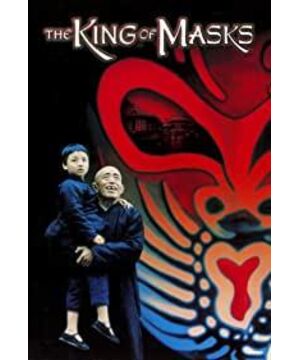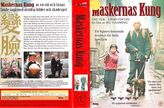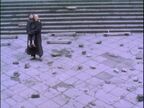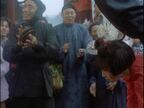Basic information:
Director: Wu Tianming Screenwriter: Wei Minglun
Starring: Zhu Xuzhou Ren
Yingyi . Plot record and plot analysis:
"Changing Face" tells the story of a Sichuan river and lake face-changing artist who inherited a stunt during the Republic of China, reflecting many social problems, and also discussing the beauty and evil of human nature.
The film begins in a mist of green tone, and the face-changing king rowed a small boat to a place in Sichuan. "Brother, every time I go to the precious place of the dragon, I must first visit the Renyi Church, the Zhongzuo Yishe, the peasants, industrialists, and businessmen with robes, plus the Church of Jesus Christ." This piece of performance singing immediately reflected the image of an old Jianghu to the audience. . If you go to other people's territory, you have to curry favor with various social groups and organizations in your language. Although it can't be said that he is proficient in accidents and exquisite in all aspects, it can also be seen that the old artist's sophistication in running the rivers and lakes, and there is a kind of cautious helplessness in it. And his face-changing stunt is superbly eye-catching. The layman watches the fun, the expert watches the doorway, and the local celebrity, Liang Sulan, known as the "Living Guanyin", values the skills of the face-changing king. I made a special trip to the teahouse to discuss with him, and sincerely invited the master to join us. The face-changing king has a straightforward personality, and quickly interrupted Boss Liang, "Beggars also have their own dog-beating sticks." Boss Liang had to say: "The generals will not dismount, they will go their own way." The identities of celebrities bully or despise Jianghu artists. It's not because he wants to stealthily learn stunts or add luster to the troupe, but he is just worried that the master's stunts will be lost out of a kind of sympathy for artists.
At this point, the face-changing king had the idea of finding a successor to inherit the mantle. On the way back, the face-changing king wanted to ask for a goddess of mercy, but he got the Purdue goddess of mercy. This little bridge actually hints that the face-changing king will not be able to get his wish in the end. The worship of Buddha is shown many times in the film, and it can be reflected in the Leshan Giant Buddha and the fortune-telling of nuns before God's gift. The face-changing king wandered alone in the rivers and lakes, and his inner spiritual sustenance was all placed on the Buddha. This shows the cowardice and helplessness of the face-changing king about his own destiny.
In the human traffickers market, many girls are sold at extremely low prices, and some family members give them away directly because they cannot support them. Because of the old rule of "passing men and not women", the variable king decided to find a "teapot mouth". The dog baby said "Grandpa", and easily hooked the face-changing king's heart, took him to buy new clothes, and immediately used the face-changing face to tease the dog when he arrived on the boat. During the meal, Grandpa said, "It's all yours", just this sentence shows that the face-changing king loves his heirs, and he is ready to dig his heart out. And the picture of the dog tickling the grandpa for the first time on the boat is accompanied by soothing music, and the beauty of the family's happiness is immediately expressed. This reminds me of the journey of the lonely old grandfather and the lovely little girl in the French movie "Butterfly". Family happiness does not have to have too many restrictions, whether it is China or foreign countries, whether living in poverty or abundance. These are completely irrelevant in the pleasure of the old and the young. The old actor Zhu Xu was already too old when he starred in this film, and he naturally showed his kindness very well, which moved people and warmed their hearts.
However, when he asked the dog to piss the boy when he was injured, he finally realized that he had been deceived. I wanted to drive the dog away, but I couldn't bear it. Since then, the dog baby is still the dog baby, but the grandfather is already the boss.
When he was performing arts, he met a soldier. Although he was also a member of the Brother Laohui, this soldier wanted to change his face and Wang Lu had a unique skill. Gouwa boldly reprimanded the soldiers, and finally the face-changing king handled it smoothly. On the way back, he sang, "Longyou Shoal was played by shrimps, tigers fell and Pingyang was bullied by dogs", and the helplessness and sadness of running around the rivers and lakes.
When the owner of the hotel expected "Living Avalokitesvara", the variable king said, "People are the heads on the dragon lanterns, which are about to light up, and the cherries in March are red. , can't climb high." But he also said, "Live on yourself, and travel the world without asking for others." While lamenting the language art of this film, we also see the confidence and value of the face-changing king in his own skills. When Gouwa tickled the "boss" for the second time, he also taught Gouwa that he should not steal alcohol, "If you have the ability to travel all over the world, you can't do anything if you don't have the ability." , Soldiers valued their gun barrels. In that era, being able to eat was a kind of pride.
The dog baby is cooking delicious food for the boss on the boat. The face-changing king likes this little girl at this time, but he also complains, "How nice of you to be a boy", and the dog baby asks back, "How can I compare Bad boys?" Here is the face-changing king who slowly recognizes Gouwa, and finally decides not to care about the old traditions, but to pass on art to a girl like Gouwa.
But the dog baby accidentally burned the boat while peeking at Facebook under the lamp, and finally left the face-changing king. He was caught by the traffickers again and asked to take care of Tianci. Gouwa sees Tianci as a "teapot mouth". In order to repay the boss, he innocently sends the child to the boat. The face-changing king learned from the mouth that he was sent by "sister", and immediately thought of the dog, standing by the river and shouting for her to come back. It can be seen that the face-changing king misses the dog baby. At this time, it can be seen that the face-changing king's prejudice against girls has been reduced again.
However, Tianci is the grandson of the local squire, Mr. Wen. The police arrested the face-changing king as a human trafficker. The dog baby was overwhelmed with remorse, and ran to see the boss. The face-changing king was already a little desperate. He tore off his mask and said in tears, "I owe you a decapitation in my previous life, and I will repay the debt of your name in this life." Helpless again, as a Buddhist believer, I believe in the concept of reincarnation, and I also admit that I have a predestined relationship with the dog. At this time, there is no prejudice against girls at all.
Gouwa was instructed by the hotel owner to ask Boss Liang, and then used the method that he and the face-changing king learned from watching the Sichuan opera "Guanyin Obtained the Way", and threatened the teacher before hanging on the stage. At such a young age, and a girl, it is admirable to have such courage.
The face-changing king was finally rescued. When thanking his benefactor, Boss Liang said: "Although the world is hot and cold, there is true love in the world." Dog baby, enjoy family happiness.
two. The theme of the film: Praise the beauty of human nature, the truth, goodness and beauty of human nature will eventually overcome the narrow and backward traditional concepts.
three. Culture in Film:
The artistic features of this film should benefit from the contribution of the screenwriter. Wei Minglun is known as the "Ghost of Bashu". As a native of Sichuan, he is naturally familiar with the customs of Shu. Face-changing is a very famous stunt in Shu. On this basis, Sichuan's wine culture, Buddhist culture, teahouse culture, stage culture, language culture and so on are all carefully expressed. Students are fortunate enough to go to Shu for many times to visit the scenic spots and investigate the style. The simple and honest, loyal, fun, playful and lazy characters of Sichuan people are all shown in this film.
In addition, Sichuan Brother Laohui appeared many times in this film, and the face-changing king himself is a robe brother. During the period of the Republic of China, the Ge Lao Association had become an open social organization, and all kinds of people had joined it. It is divided into five schools: "benevolence", "righteousness", "propriety", "wisdom" and "trust". And Jianghu artists like the face-changing king are classified as "faith", which is the lowest grade. In fact, the resolution of the various drama contradictions in this film is mainly based on the word "righteousness". The influence of Ge Lao on the Sichuan people is deeply rooted, and the Sichuan people value "righteousness".
Four. Audio-visual analysis:
Picture:
The film is dominated by cool colors from the beginning to the end, green is the color of plants, and blue is the color of water, which is in line with the southern temperament. The application of color is simple, harmonious and friendly. And the thick fog has a sense of mystery, creating a unique poetry of Bashu. It is slightly similar to the beauty of Western Hunan described by Shen Congwen. General ink painting.
Sound:
The soundtrack of the film is soothing and moving, and the unique sound effects in Sichuan Opera make the picture and the plot harmonious.
Language:
The language dialogue of the film is a major feature. The countless proverbs in the film properly and accurately promote the development of the plot, and reasonably and profoundly reflect the inner and outer activities of the characters. However, there is a pity. Although Wei Minglun's work as a screenwriter makes the language very flavorful, it will inevitably lose the effect of common sayings if it is mainly performed in Mandarin. Sichuan people usually stretch the last syllable very long in their speeches, and they like to use reduplicated words. For example, when the face-changing king came out of prison, he was called "bangbang". Very cute, sentimental, and exudes a lazy and leisurely temperament. Speaking of such a saying is naturally more authentic.
five. Narrative clues:
Take the process of the gradual disappearance of the prejudice held by the face-changing king towards the dog girl as a clue.
six. Analysis of the main characters:
The face-changing king: a persevering, stubborn and helpless kind-hearted little guy in the transition era. The face-changing king lived to that age, and he has been lonely all his life. He is extremely obsessed with Buddhism. He is still a small person who relies on the afterlife. In addition, the happy spiritual atmosphere he needs when performing arts makes him optimistic and cheerful. Experienced a lot, is the old rivers and lakes, doing things cautiously, sophisticated. On the other hand, some traditional ideas are conservative and somewhat pedantic, insisting on "passing on women without wearing clothes, and passing on men without passing on women". There is no melancholy in this matter, very stubborn. Although living in poverty, he has a strong spirit, is very confident in his superb skills, has his own principles, and can achieve "the poor cannot be moved". The most important thing is his kind human core, which eventually prompted him to give up the narrow and backward traditional concept.
Gouwa: Born in an era where sons are more important than women, her destiny makes her have to take on too much when other children enjoy the joy of childhood. Living is her simplest wish. But when I meet the face-changing queen, I enjoy the beauty of life and yearn for it. I resist secretly and do everything consciously. When the boss complains, I have to say, "I am worse than a boy." This is a A declaration of protest. He is also very kind, grateful, and kind.
Boss Liang: Although he is a celebrity worshipped by thousands of people, he has an unfortunate past. There is a kind of sympathy for the face-changing king who is also an artist, and after encountering it, he naturally wants to save the folk stunt. Because of the singing role, he knew that he had half a daughter, and in the era of patriarchal preference, he naturally felt sympathy for the dog baby. As the name suggests, "Living Avalokitesvara" is an actor, but his chivalrous bones are gentle and help the weak. However, it is still necessary to rely on the power of those in power to rescue, which also has its sad side.
View more about The King of Masks reviews








